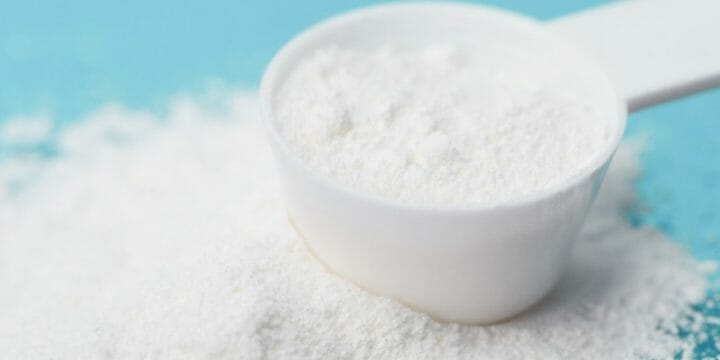As a medical doctor, I frequently encounter patients struggling with leptin resistance, a key factor in appetite and weight regulation.
Understanding the pivotal role of leptin in our bodies, I've decided to share my expertise through this article.
Here, I will guide you on effective strategies to increase leptin levels, a crucial step towards achieving weight loss and maintaining a healthy balance.
Quick Summary
- To boost your leptin levels, avoid meals that lower leptin sensitivity, consume meals that stimulate leptin production, and embrace a healthy diet.
- Individuals with low leptin levels can restore them by getting enough sleep, regularly working out, and avoiding refined carbs.
- Poor sleep can lead to a 15% decrease in leptin levels, increasing hunger.
- In my opinion, consistently balancing diet and exercise is the most effective strategy for managing leptin levels and achieving sustainable weight loss.
How Can I Increase My Leptin Levels to Lose Weight?
To increase foods that increase your leptin levels for weight loss, you simply need to avoid foods that reduce leptin sensitivity while increasing those that stimulate it.
In my experience working with patients, I've seen firsthand how doing this can significantly impact weight loss. Let's take an in-depth look at how to do it.
1. Avoid Foods That Reduce Leptin Sensitivity

Scientific evidence suggests that certain foods may increase triglyceride levels in your blood.
Triglycerides are proven to cross the blood-brain barrier, increase inflammation, cause insulin resistance, and induce a medical condition called leptin resistance, as per studies published by the International Journal of Obesity [1].
These unhealthy food choices include:
- Foods high in added sugar (including fructose) like doughnuts, cakes, sweet pastries, cookies, chocolate, candy, some cereals, sugary soft drinks, sodas, fruit punch or juices, high-fructose corn syrup, etc.
- Refined carbohydrates with a high Glycemic Index (GI) such as white bread, pizza, potatoes, pastries, pasta, sweets, soft drinks, and other highly processed foods with added flour or sugar.
- Foods high in artificial trans fats such as cakes, cookies, French fries, and other fried foods, some pastries, microwave popcorn, margarine, cooking vegetable and seed oils too high in omega-6, and all highly processed foods containing partially hydrogenated vegetable oil.
- Processed meat like bacon, pepperoni, sausages, ham, hot dogs, beef jerky, corned beef, smoked and deli meats, etc.
- Alcoholic drinks, and other sweetened beverages, and similar foods high in refined grains, added fats, sugar, artificial flavors, etc.
2. Eat Foods That Stimulate Leptin Production

From my professional experience, I've observed that a well-balanced diet rich in healthy, nutritious whole foods can effectively boost leptin levels.
In fact, several of my patients have reported better control over hunger and a noticeable improvement in weight management once they incorporated these dietary changes.
Additionally, numerous patients have overcome fertility challenges by balancing their leptin levels, a testament to its importance in reproductive health.
Foods that stimulate leptin production include:
- Anti-inflammatory foods.
- High-protein meals. The American Journal of Clinical Nutrition asserts that a protein-packed breakfast can enhance weight loss by improving leptin sensitivity [2]. In addition, protein helps you build lean muscle mass and prevent muscle loss while losing body fat mass.
- Healthy fats. This includes monounsaturated fats and long-chain omega-3 polyunsaturated fatty acids as shown by Food and Nutrition Research [3].
- Plenty of soluble fiber, which may help improve your gut health and prevent obesity.
- Complex carbohydrates from fruits and vegetables, which help decrease appetite and calorie intake.
- Foods high in Zinc. Studies by Obesity Research suggest that Zinc deficiency may result in obesity-related leptin resistance [4].
What Foods Are High in Leptin?

In my practice, I often explain to my patients that while the body doesn’t absorb leptin through the intestinal tract, certain dietary choices can influence leptin sensitivity.
The healthy foods that may increase your leptin sensitivity, helping you suppress appetite, metabolize food more efficiently, and burn excess body fat include:
- Non-starchy vegetables - leafy greens, kale, cauliflower, spinach, broccoli, and similar veggies raw, steamed, roasted, in salads, broth-based soups, etc.
- Fresh fruit - berries (blueberries, raspberries, strawberries, blackberries) and other low-sugar fruits with lower GI
- Legumes - lentils, peas, beans, etc.
- Whole grains - brown rice, whole-grain bread and pasta, chickpeas, quinoa, oats, and similar high-fiber cereals.
- Lean meats - poultry, fatty fish (salmon, mackerel, herring, sardines), seafood, grass-fed beef, or lamb.
- Healthy fat in moderate amounts - olive oil, canola oil, flaxseed oil, high-oleic sunflower oil, avocados, nuts and seeds (almonds, pumpkin), or fats naturally found in plants or animal products like eggs, dairy (yogurt and fermented cheese), cocoa, dark chocolate, etc.
- Mushrooms
- Unsweetened beverages - lemon water, herbal, black, or green tea.
3. Make Long-Term Diet and Lifestyle Changes to Improve Leptin Resistance

I've guided numerous patients through the process of making long-term diet and lifestyle changes to improve leptin resistance. It's a journey, but I've witnessed remarkable transformations in overall life quality and health as a result of these sustained changes:
- Contribute to a better overall life quality.
- Help you increase leptin sensitivity and metabolism.
- Positively influence or help avoid health problems like high blood pressure, heart and kidney problems, diabetes, metabolic syndrome, issues with the thyroid gland and adrenal glands hormone secretion, and many other medical conditions common in obese people.
Here are several healthy lifestyle habits beneficial in helping you achieve higher leptin levels to lose weight and keep it off.
Follow a Sustainable and Healthy Diet

Adopt a leptin-focused diet, as recommended by nutritionists, to lower triglycerides and enhance fat loss.
Key practices include consuming 20-30g of protein at breakfast, three meals a day without snacks, low carb intake, early dinner, 12-hour fasting overnight, portion control, and stopping before fullness.
In addition, intermittent fasting as supported by the Journal of Translational Medicine, aids in leptin regulation, health improvement, and accelerated weight loss [5].
Avoid drastic calorie cuts and lectin-rich grains (like wheat, barley, and rye) that may hinder leptin binding and cause resistance, as indicated by BMC Endocrine Disorders [6].
Instead, eat mindfully and allow occasional cheat days to boost leptin levels and metabolism, as suggested by the International Journal of Obesity, aiding in hunger control and weight management [7].
Engage in Moderate Physical Activity Regularly

Studies from the National Library of Medicine show that exercise increases leptin sensitivity [8].
In my practice, patients consistently exercising have improved hormone balance and weight management, reducing obesity-related risks like breast cancer which has been linked to high leptin levels often found in obesity.
Regular physical activity not only helps in managing weight and enhancing leptin sensitivity but also mitigates genetic predispositions to weight gain, making energy regulation more efficient.
“When a goal of exercise is to lose weight or improve energy, overtraining can clearly be a major barrier to achieving those goals.”
- Chris Kresser, M.S., Clinician & Educator in Functional Medicine & Ancestral Health
Incorporate 30-60 minutes of daily exercise, combining moderate aerobic and strength exercises, and add weekly high-intensity interval training (HIIT) to boost metabolism and release beneficial hormones like HGH and endorphins.
This regimen aids in fat burning, stress reduction, and regulation of appetite and cholesterol. However, avoid over-training to prevent increased cortisol, oxidative stress, and negative impacts on leptin levels, fat metabolism, and immunity.
Get Enough Good Night’s Sleep

Research by the Public Library of Science of Medicine shows that chronic lack of sleep and poor sleeping habits interfere with normal leptin and ghrelin levels - the two hormones that regulate appetite [9].
“Sleep is key, essential, absolutely downright necessary for our basic physiological operations – with special support for neurological performance, endocrine balance, immune system functioning, and musculoskeletal growth and repair.”
- Mark Sisson, The New York Times Bestselling Author of The Keto Reset Diet
Not getting enough sleep will raise your “hunger hormone” ghrelin and decrease leptin levels, making you hungrier and increasing the risk of obesity.
Poor sleep can lead to a 15% decrease in leptin levels, increasing hunger, as per Biological Research for Nursing [10]. Therefore, it's crucial to get 7-8 hours of quality sleep nightly in a dark, quiet room free of electronics.
Also, avoid large meals, caffeine, and alcohol before bed to improve sleep quality.
Destress

Stress elevates cortisol, which when persistently high due to chronic stress, may cause lower leptin levels, comfort eating, anxiety, depression, and low energy, complicating weight loss.
Stress-related emotional eating leads to weight gain from overeating and poor food choices, as a stressed hypothalamus craves high-carb foods for quick energy.
Managing stress is crucial; this includes getting adequate sleep, socializing, exercising, reading, taking relaxing baths, or engaging in activities that help you unwind.
FAQs
What Is Leptin?
Leptin is a hormone derived from fat cells that prompts your brain to stop eating when your body has stored enough energy. It's often referred to as "satiety hormone," "fat controller hormone," and "starvation hormone."
- https://www.nature.com/articles/ijo2017231
- https://www.sciencedirect.com/science/article/pii/S0002916523295076?via%3Dihub
- https://foodandnutritionresearch.net/index.php/fnr/article/view/1054
- https://onlinelibrary.wiley.com/doi/10.1038/oby.2000.65
- https://translational-medicine.biomedcentral.com/articles/10.1186/s12967-016-1044-0
- https://bmcendocrdisord.biomedcentral.com/articles/10.1186/1472-6823-5-10
- https://www.nature.com/articles/0801395
- https://www.ncbi.nlm.nih.gov/pmc/articles/PMC3827558/
- https://journals.plos.org/plosmedicine/article?id=10.1371/journal.pmed.0010062
- https://journals.sagepub.com/doi/10.1177/1099800410366301
About The Author
You May Also Like






